Queridos amigos y familiares, 1-3 de Agosto, 2001
John here. I begin this week’s missive in the spirit of procrastination. Tomorrow night I’m supposed to give a talk in Portovelo to high school students, after they view excerpts from the film footage my grandparents took in the ‘30s and ‘40s. I haven’t prepared anything, and of course doing it in Spanish adds an element of sport. People here are extremely good-natured about my mistreatment of their language, but one does want to avoid major linguistic faux pas, such as calling the head of the Catholic church a potato (el papa vs. la papa). My only major worry is that someone will ask me a question that I flat out do not understand (a likely prospect, because it happens to me all the time down here).
Also in the public events department, on Monday I attended a ceremony at the city hall to witness the signing of a public works contract to improve the water treatment system, involving an expense of some $800,000. Presiding were the mayor of Zaruma, the governor of the province of El Oro, its two representatives to Congress, two officials of the state central bank, the mayors of all the neighboring towns — and of course the Reina de Zaruma in her tiara and sash. All of these were arrayed at a banquet table at the front of the hall. And because half of the dignitaries arrived late, the line of chairs facing the audience grew to somewhat comical proportions as the morning wore on. The tone of the speeches started with the monotony befitting a party congress in Stalinist Russia, but after about an hour the gloves came off. The speakers started yelling into the mike, accusing one another of failing to advance the Cause of the People (“The road to Loja is a bloody disgrace!”) pleading for unity (as defined by their own party line), and evoking the territorial dispute with Peru (“We didn’t fight just for colors painted on a map on the wall!”). After the ceremony ended with the Anthem of Zaruma, the audience scrummed to the front to participate in the match. I didn’t stay to see who was declared the winner and who required paramedics, and there weren’t any referees, but I sensed that all the locals were keeping score.
Now it’s two days after writing the above. The August winds are in full force, with dried leaves the size of saucers bouncing down the hill past our window and people squinting into the dust as they climb against it. We just returned from a morning spent on the nearest hilltop, chasing butterflies, drawing, climbing rocks, and soaking up the views we will be leaving before long.
I am pleased to report that I survived the event in Portovelo with my linguistic dignity (such as it is) more or less intact. The audience of 250 was a mixture of students and older folk, and I’m afraid the latter drowned out any possibility of dialogue with the former, but it was interesting nevertheless. The toughest part was the people who asked me, in more or less pointed terms, when there will be a new wave of investment in Portovelo comparable to Grandfather’s time. I had to answer that I thought the American company came at a particular moment in history, with a particular mission to spread the gospel of capitalism, that is not likely to recur. But the questioners’ subtext of “How, and when, are you going to help us?” was loud and clear, and my tacit response of “I don’t think I can,” rang fairly hollow.
That message accentuated one of my persistent thoughts of this summer. I am continually struck by the size and challenges of the enterprise Grandfather took on, and by the ideals of progress and civilization he espoused. My generation grew up adept at pointing out the contradictions inherent in those ideals and the flaws in that enterprise. And one can’t honestly tell the story of Portovelo without mentioning the high incidence of silicosis and tuberculosis in the early years, the tons of gold shipped to New York with only minimal taxation, the hillsides deforested, the rivers polluted. But still there remains a dominant theme here that the time of the Americans was a golden age, and we critics have done poorly in creating an alternative vision that comes close to matching its organizing power, discipline and self-sacrifice. One of my interviewees said, “We have lost our sense of heroism”; indeed, there is something heroic about the early photos of staggering mules and shoeless men hauling heavy machinery over the muddy mountains. But Portovelo of today is not alone in its need to recover an ethic of heroism from the cultural morass.
The best I seem to be able to do these days is to be alert for the sublime moments in everyday life. Like Tuesday, which would have been Dad’s eightieth birthday. I had planned to carve out some time in the day to mark the occasion, but I had a shoot in the morning, the kids were clambering in the afternoon, and before I knew it dinnertime loomed. Suddenly I looked out the back terrace to see the towers of Zaruma and the Portovelo valley bathed in the clearest golden light I had seen all summer. I grabbed the video camera and hustled out to the promontory I have been passing for weeks thinking, “In the right light . . . .” Dios mio, was it the right light. The sunset just kept unfolding over the high sierra until the moon rose in the dusk.
That night I had a dream, drenched in the same light, of a garden party of old people dancing. It seemed to be a wedding; the couple of honor were tall, ancient and dressed in luminous white as they waltzed on the lawn. And Dad was there, smiling and hale, shaking my hand, loving the party.
Here’s hoping you’re well and enjoying the onset of August. We have ten days left before a week on the beach reorients our minds to life in Colorado. The kids are ready, talking fondly of all the things they will do when they get home. I have refrained from telling them about reverse culture shock, which I know awaits . . . .
***
Beret here. Happy 80th birthday, Jack Tweedy! We are glad to have been able to see the house where he was born (in Spanish, the verb for giving birth is “dar a luz”, which literally means “to give to light” — beautiful, no?). It feels like Jack’s spirit hovered near us this week. As for last night, I was very proud of John, because it was a loaded evening — the South American Development Company represents a mythical past for which there is no small amount of nostalgia, and to the Portovelenses, John represents both the past and in a lesser but still palpable way symbolizes the hope of the future (for only a company with very deep pockets can pump the thermal water out of the bottom of the mine, where the mother lode, many believe, is still waiting.) And just for the record, John’s Spanish was impressive. We speak a lot more Spanish here than we did during our year in Argentina when I was buried in books and John was writing a novel.
This week we had two very wonderful outings to two different rivers, including a videotaping/surreptitious bathing outing yesterday to Zaruma’s beautiful and forbidden source of potable water. On the way there, we visited the manjar-making place. It’s a large shed with five massive kettles for the making of manjar, a caramel dessert made mainly from milk and sugar. A woman stirs the boiling manjar for four hours with a wooden paddle. It was like seeing a factory from the Middle Ages that had reached the 20th century through the addition of cooking gas in the place of firewood.
Sunday at the Rio Pindo was an interesting window on local culture. You need to know that the Rio Amarillo (Yellow River), which flows murky, muddy, and yellow through Portovelo, is heavily contaminated with mine trailings, mercury, and sodium cyanide. Its sister river, the Rio Pindo, is in comparison relatively untainted. What I find intriguing is the myth of the Rio Pindo, that it’s as pure as Rocky Mountain spring water just burbling out of the earth. I don’t know where the Pindo originates, but it flows past casas de campo (simple earthen dwellings without running water) and ruminating cattle and other signs of human encroachment.
We arrived at a shady bend in the river in two pickup trucks with four other families and proceeded to unload an impressive supply of cooking pots, foodstuffs, and other infrastructure (guitar, hammock, etc.) We set up camp by the river and set a huge kettle of river water to boil for coffee. In the course of the morning, my friend said, “This water is cleaner than the agua potable in Zaruma.” By the time we had been there for a few hours, our children had peed in and near the river (who knows what the adults did), we had washed dishes with soap, washed a carseat liner (for Maggie, a 9-year-old with cerebral palsy), and swum (shod!) in the river. We also burned up local tree limbs, blackened rocks for two different cooking fires, and consumed a banquet.
From the moment we arrived, the women (3 of them, not counting the otherwise occupied mother of Maggie and the useless gringa Beret) began to cook. They made an elaborate soup of banana, peas, and pork fat(?). Then we had marinated chicken, rice, a cold salad of grated carrots, peas, green beans, onion, potato, and mayonnaise dressing. And a fabulous chocolate cake with manjar in between its layers. All prepared painstakingly on the river bank (except for the cake and the premarinated chicken) for h-o-u-r-s while everyone else was having fun in the river. I told my friend Ana that I would never, ever go to so much trouble about food (she was up at 5 am doing prep cooking). But for these women, cooking and chatting and feeding their broods was what gave them pleasure. The children — all 9 or 10 of them — played in the river, catching tadpoles and frogs and butterflies, swimming, and looking for gold. We all came home sunstruck and happy.
Our kids continue to invent their own entertainments here, though we’re scraping the bottom of the barrel in terms of raw materials. Every box in the house, from tea boxes on up to cereal boxes pilfered before the cereal has even been eaten, has been made into a house. There’s a cardboard swimming pool with popsicle stick steps, a bed, and three very little people. August is the month of wind and dust, so children are making kites out of the ubiquitous striped grocery/garbage bags and string. We bought extra big grocery bags for a dime apiece and right now out front are five kids with all the scissors and knives we own trying to take a length of bamboo into kite-sized sticks. Knives are apparently a tool most kids are handy with (though I was dismayed to see our kitchen knife being dragged across the concrete in an effort to cut a plastic bag to size). The other evening at dusk we made it to the top of the Cerro Zaruma-Urcu, which is a large hill that offers a lovely view of the city. We pulled out our water bottle and cookies and Paige’s friend Karen pulled out a knife with an 8-inch blade and several fruits that taste like lemons, only sweeter.
There has been no school for the elementary school kids this week, which has made things more peaceful at our house (during “recreo” or recess, we sometimes have two dozen uniformed kids out front, half of them with their faces pressed through the wrought iron grille to look for our kids through the window.) Thank you to those of you who wrote asking how to offer supplies to the schools here. Because it is too expensive to send things (not to mention the problem of customs) and because the kids’ supplies are different here, we are going to buy locally and deliver some supplies before we leave.
The story of the friend who teaches full-time for very little money and sells Avon on the side (for which she receives “product” but no payment) broadened into a river of sorrow when I learned more about how things really are in that family. Everything they touch has gone bust. They tried to ranch cattle near the coast by taking out a “cattle loan” from a bank (the bank gives you your loan in the form of livestock), but there was a five-year drought and the cattle starved to death. They are still in debt to the bank even though they lost their land. These days they don’t have warm water in the shower (can’t afford the electricity) or eyeglasses for the daughter with myopia, and the two teenagers barely made it to high school this year because when the school year started the parents didn’t have the $12 in annual fees for each child. Needless to say, they are eating a lot of rice and vegetable soup. The worst of it is the husband has had very bad luck with jobs, though he is willing to work in the Oriente (the Amazon basin) or wherever work is to be had. He is so discouraged that he sometimes tells his wife he wants to die; she is afraid he might just follow through on that impulse. The thing is that this family looks and acts like the urban middle class, which is the group of people we’ve been hanging out with this summer. But open one door and you find….
Yesterday’s newspaper had an interesting statistic. A government institute here says that the “basic” cost of living for a family to get by in Ecuador is $290.66 a month, but that the average family has only $200.73. Meanwhile, we are worried that our upstairs neighbor is having a health crisis (kidneys? liver?). The doctors are still on strike, though emergency cases are being taken at hospitals. When I urged him to go to the little hospital here for care a few minutes ago, he said “No money.” I said, “We’ll pay.” He said, “That would make me ashamed.” He brings us treats — warm bread, candied peanuts. Two days ago a beloved local pharmacist died suddenly of a heart attack. Hundreds of people went to his funeral today, which means we were a town dressed in black mourning clothes. Don Marcelo was everyone’s friend and he was also the only pharmacist who gave out medicine to anyone in need, and let them pay when they could. This is the most anguish I have witnessed all summer.
The headline story in Quito paper for the last three weeks has been that of a large bank that suddenly shut its doors, swallowing many people’s life savings and causing thousands of salaries and pensions to go unpaid. The doctors’ strike is still on and the news is that when the police tear-gased a peaceful protest march of doctors outside a maternity hospital in Quito, the gas went right in the open windows (and maybe a canister went in too?) and gased a bunch of preemies in their incubators and new mothers in their nightgowns. Two babies died of asphyxia and the fallout is still raining down.
And now, for a lighter topic. Being able to get around in Spanish doesn’t solve all communication problems, I’ve found. There’s the question of culture gap. There’s also what I’ll call the “macho creep.” Creep as in a thing that goes crawling and creeping across the floor (la cucaracha, la cucaracha, ya la vemos caminar). John and I have a few gendered habits of labor division in the U.S., though we’re pretty flexible on the whole. So what happens to us when we find ourselves in a traditionally macho society? You guessed right — the macho creep! The form it takes is so insidious it took me some weeks to notice it was happening. For instance, when a man comes over to see John about something, I feel compelled to serve beverages to the two of them. And if a male acquaintance invites John to bring us to an event or on an outing, it is expected that John can answer for the whole family without consulting any of us. After all, es el padre de la familia! John gave into this a few times before I said, “Basta con esto!” Then when he told one of these men that he needed to consult with me, the fellow said, “Oh, you have to ask permission.”
Strange cultural moment: A woman friend asked whether in the United States we routinely cut something inside our daughters’ bodies. WHAT? It took a few minutes and a piece of paper, and a sidetrip into the land of episiotomies, for me to understand what she was asking. She had seen a T.V. show about American parents who were so liberal (?) or … I can’t even think of a word here … that they wanted to dispense altogether with the notion of virginity in their daughters, so they had doctors surgically remove their hymens. My friend wanted to know whether we had done this thing to Paige. I told her I had never heard of such a thing (have any of you?), that it was definitely not a common practice in the U.S. As you can imagine, women are very careful to protect their honor here and I have the impression that there are a lot of virgin brides.
Being a housewife in Ecuador is a luxury of sorts — you have the luxury of getting to cook 3-6 times a day (I’m not kidding) and, unless you’re wealthy, to wash the family’s clothes in a concrete utility sink by soaking them in a bucket with detergent and then scrubbing, scrubbing, scrubbing them with abrasive soap, wringing out the water the old twist-the-rope way, and hanging them inside out on the clotheslines to dry. The front page of yesterday’s Quito paper business section announced a course called “Electricity for Women.” We women are being offered the opportunity to solve the problems presented by vacuum cleaners, irons, and other electric apparatuses. Felicidades a todas! (But let’s not be fooled — vaccuum cleaners are for the urban rich. I haven’t seen a single one in Zaruma.)
Many women here, especially the young and the hip, dress in tight jeans and spandex halter-type tops. If you’re under 40, that is, or even if you’re 40 and are going out dancing. When I contemplate going to a Catholic country, I prepare my wardrobe as if I were going to teach at a junior high school run by Jesuits, with the added thought (in this case) that it could well be hot and that my clothes may be ruined by summer’s end. I favor two tent-like cotton dresses I bought in Bali years ago, which earned me the question, “Are you expecting a baby?” Another equally startling question is, “Can you have more babies or did they operate on you?” It took me a while to unravel this question. What it means it that when women don’t want to have any more babies here, they typically undergo tubal ligation, subsidized by the state. A more philosophical question: who is more likely to be adulterous, United States men or Latin American men? For bonus points, discuss your reasoning. (I actually had this conversation with someone last week and we ended up wallowing around in the difference between Protestantism and Catholicism on the question of guilt and absolution, on machismo, and on equal rights for men and women.)
Now that I’ve set you thinking about a strange array of things, it’s time to go fly kites! They came out beautifully, thanks to the talents of two teenaged boys. John just made Marcus a kite out of newspaper. This I’ve got to see. Next time we write, it’ll be to say adios to Zaruma and to this series of letters. Thanks for being our gracious and wonderful audience. As they say in Zaruma, chao!
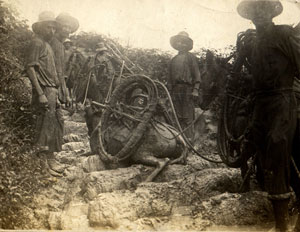 We are perched on the side of a mountain in this colonial mining town in southern Ecuador, where John’s grandfather worked for thirty years between the world wars and his father was born, and where we will be spending the summer shooting a documentary. The subject? Well, we’re still not sure. But today’s subject was the alumni reunion celebration of a local high school, where half the town watched the other half parade through the narrow colonial streets to the central plaza, and where they danced to a brass band until noon (in fact, they’re still dancing now at 10 pm). In an era when we spend so much effort “building community,” it’s heartening to be in a place where the web of life is out on the street, not on the internet.
We are perched on the side of a mountain in this colonial mining town in southern Ecuador, where John’s grandfather worked for thirty years between the world wars and his father was born, and where we will be spending the summer shooting a documentary. The subject? Well, we’re still not sure. But today’s subject was the alumni reunion celebration of a local high school, where half the town watched the other half parade through the narrow colonial streets to the central plaza, and where they danced to a brass band until noon (in fact, they’re still dancing now at 10 pm). In an era when we spend so much effort “building community,” it’s heartening to be in a place where the web of life is out on the street, not on the internet.
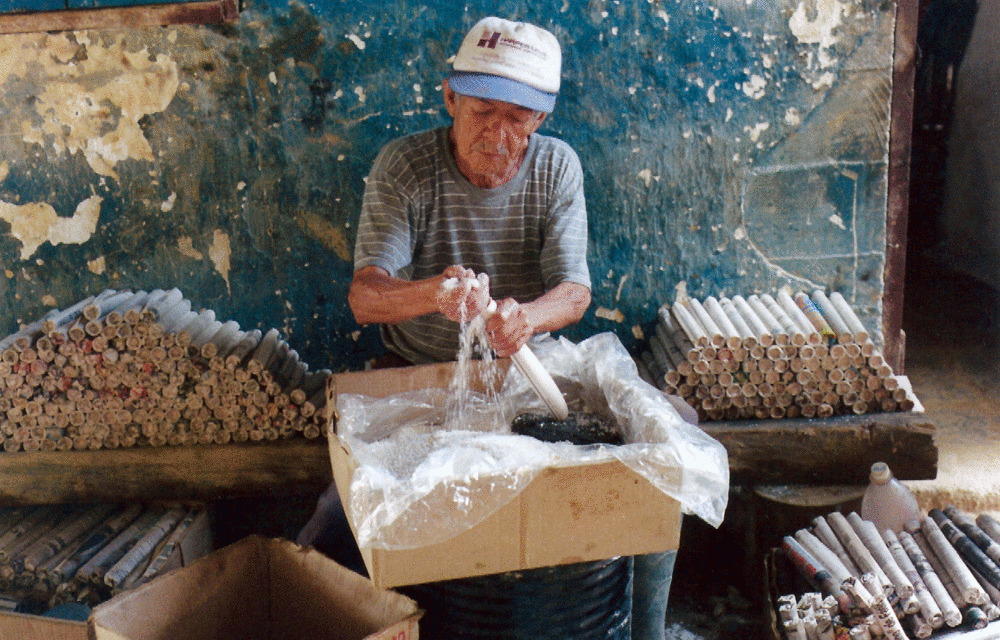
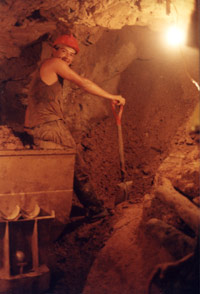 We enjoyed writing our first joint letter and especially enjoyed hearing from some of you in the days that followed. I feel like my senses are sensitively tuned at most times here. When I’m at “zaruma.net,” the sole (and new) internet “cafe” here in Zaruma, which is also a larga distancia telephone outlet with a shortage of telephone lines (one line — so its either phone or internet but not both at once), part of my mind is in the northern hemisphere, and the rest is in the small room, grappling with the stiff keyboard and its differently placed keys, the music and engine sounds drifting in from the street, and whatever else is going on. Two days ago, the Ecuadorean man next to me was weeping copiously into his email, which struck me as brave and open, not what a man from the U.S. would be likely to do in such a public setting.
We enjoyed writing our first joint letter and especially enjoyed hearing from some of you in the days that followed. I feel like my senses are sensitively tuned at most times here. When I’m at “zaruma.net,” the sole (and new) internet “cafe” here in Zaruma, which is also a larga distancia telephone outlet with a shortage of telephone lines (one line — so its either phone or internet but not both at once), part of my mind is in the northern hemisphere, and the rest is in the small room, grappling with the stiff keyboard and its differently placed keys, the music and engine sounds drifting in from the street, and whatever else is going on. Two days ago, the Ecuadorean man next to me was weeping copiously into his email, which struck me as brave and open, not what a man from the U.S. would be likely to do in such a public setting.
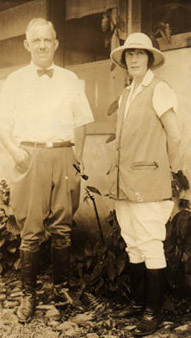 Some things remain, though. My father’s and aunt’s births remain inscribed in the large folios of the Registro Civil of Zaruma, where even the staff awoke from their bureaucratic lassitude when we found the right hand-written pages from 1918 and 1921. My father’s entry confirms an old family tale, that his middle name was initially “Burr,” until the maiden aunts objected by telegraph from New Jersey that they would nave no great-nephew named after a traitor. So my grandfather relented and changed it to “Bayard.”
Some things remain, though. My father’s and aunt’s births remain inscribed in the large folios of the Registro Civil of Zaruma, where even the staff awoke from their bureaucratic lassitude when we found the right hand-written pages from 1918 and 1921. My father’s entry confirms an old family tale, that his middle name was initially “Burr,” until the maiden aunts objected by telegraph from New Jersey that they would nave no great-nephew named after a traitor. So my grandfather relented and changed it to “Bayard.”
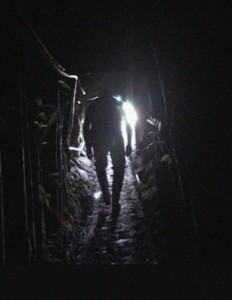 John here. It is remarkably quiet for a Saturday night. There is salsa music pulsing somewhere in the darkness, but too far off to get the melody. It has been over an hour since any M80-sized rockets exploded in our vicinity (though there were twenty or thirty earlier this evening). Only one dog is howling. Nobody is doing any late-night mufflerless transmission testing on the steep grade that winds up past our apartment. And the ten o’clock siren has come and gone, summoning all the Christians to their beds. I may actually sleep tonight.
John here. It is remarkably quiet for a Saturday night. There is salsa music pulsing somewhere in the darkness, but too far off to get the melody. It has been over an hour since any M80-sized rockets exploded in our vicinity (though there were twenty or thirty earlier this evening). Only one dog is howling. Nobody is doing any late-night mufflerless transmission testing on the steep grade that winds up past our apartment. And the ten o’clock siren has come and gone, summoning all the Christians to their beds. I may actually sleep tonight.
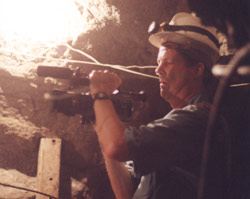 And the daily living is full of pleasure. I love the verticality of the environment, present in so many ways: the open-air bus-toboggan ride down the hill to Portovelo (I have become something of a commuter) and the slow grind back up; the switchbacking cobbled trails the miners used to take, now overtaken by ferns and floods and giant spiders; the winding concrete staircases traversing the town instead of sidestreets; the 10-degree temperature difference between Portovelo on the valley floor and Zaruma perched above; and the sweeping, enormous views so ubiquitous that we take them in like air. I, like my father, do adore mountains. And it’s great to discover where he got it.
And the daily living is full of pleasure. I love the verticality of the environment, present in so many ways: the open-air bus-toboggan ride down the hill to Portovelo (I have become something of a commuter) and the slow grind back up; the switchbacking cobbled trails the miners used to take, now overtaken by ferns and floods and giant spiders; the winding concrete staircases traversing the town instead of sidestreets; the 10-degree temperature difference between Portovelo on the valley floor and Zaruma perched above; and the sweeping, enormous views so ubiquitous that we take them in like air. I, like my father, do adore mountains. And it’s great to discover where he got it.